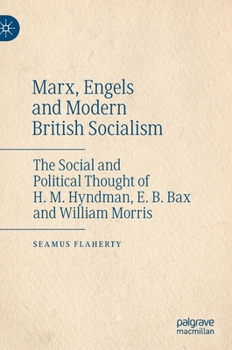Marx, Engels and Modern British Socialism: The Social and Political Thought of H. M. Hyndman, E. B. Bax and William Morris
Part 1: OriginsChapter 2: 'A Certain Hyndman': 'Tory Radical' or 'Freethinking Gentleman-Republican'?Chapter 3: Socialism in the Periodical Press: The Origins of Modern British SocialismChapter 4: The Democratic Federation and England for AllChapter 5: 'A Real Enthusiasm for the New Ideas': Bax, Marx, Comte, and Spencer
Part 2: HyndmanChapter 6: Scientific Socialism: Hyndman, Engels, Morley, and MorrisChapter 7: Wealth and Ability: Hyndman, Mallock, Toynbee, and George
Part 3: BaxChapter 8: The Synthetic Conception of History and The Religion of SocialismChapter 9: 'Historical Agnosticism': Bax, Engels, and Classical German Philosophy Chapter 10: Liberalism Versus Socialism: Republicanism, Rights, and Representative Democracy
Part 4: MorrisChapter 11: 'Sentimental Socialism'? Morris, Marx, Engels, and MillChapter 12: Conclusion
Customer Reviews
Rated 5 starsIt is not what you think
Contract law is abstract. It was developed in the nineteenth century as a generalized theory, a residual category for everything not falling into specialized law in the commercial sphere. The bargain theory of consideration was proposed by Holmes. When the general theory of contracts was developed by Holmes, (and Williston and Corbin), current cases were used. A contractual trap could not be sprung until the last moment...
0Report
Rated 4 starsA thrilling, concise expose into the fiction of contract law
Reading Death of Contract is like a fresh glass of water after a hot day at work. It refreshes the mind, and makes you think that there can be some coherence to Tennyson's `lawless science of the laws'. The beauty of Gilmore's concise and short tome (I devoured it in three hours) is that it makes you begin to see contract law for what it really is: a construct designed by academics and over clever jurists, who have hyped up...
0Report
Rated 5 starsA Classic Account of the Evolution of Contract Law
Provides an in depth account of the evolution of contract law. It has aptly been described as an "epic". Law students, lawyers and lay people alike will find this to be intriguing and thought provoking on many levels. Gilmore of course shows how contract law developed, but inquisitive people will also be intrigued at some of the other issues regarding what we think of as law, the development of law and the concept of precedent.In...
0Report
Rated 5 starsSaved my neck in law school--and I enjoyed it, too
When I took Contracts as a first-year law student, I read the cases, went to class, and didn't have the faintest idea what it all meant. It seemed to be a mind-numbing mix of similar facts with different conclusions. Then I read this book and--voila--it all seemed to flow together so cohesively and clearly. And, on top of that, the book is well written, has flashes of humor, and is very short. What a great book this is...
0Report
Rated 5 starsThis is a great book
If you are a law student or lawyer or just anyone interested in the law (from a technical perspective) this is a great history of contract. Gillmore is a very entertaining writer and I actually found myself laughing out loud. A working knowledge of Williston, Cardozo, Posner and the seminal cases in Contract law makes this book a lot more fun. You should definitely know your legal history first. Gillmore is not going to...
0Report






















